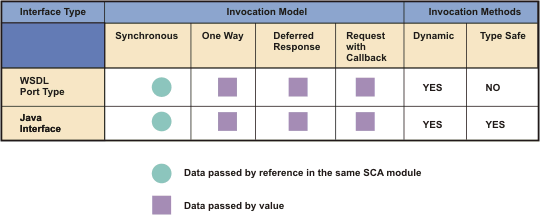IBM BPM, V8.0.1, All platforms > Programming IBM BPM > Service Component Architecture programming > SCA programming model fundamentals > Invocation styles
SCA interactions
SCA supports synchronous and asynchronous invocation of modules. Developers have the option of selecting the appropriate interfaces and invocation methods for their SCA interactions.
The diagram summarizes the different interface types, the supported invocation methods and models, and how data is passed between client and service.
For synchronous invocation, data is passed by reference within the same SCA module, while for asynchronous calls the data is passed by value. The table also summarizes when it is possible to use either type safe or dynamic invocation based upon the interface type. The dynamic invocation methods are always available for either WSDL port type or Java interfaces. However, in order to have type safe invocation methods available to the client a Java interface type must be used for the interface definition on the appropriate client reference.
Figure 1. Summary of invocation models along with supported methods for passing data

Dynamic client invocation
There are a number of key methods and interfaces needed to support both synchronous and asynchronous interaction when using dynamic client invocation.
| Interface | Methods | Description |
|---|---|---|
| Service | Object invoke(Service String, Object) | Used to invoke synchronous service requests |
| Ticket invokeAsync(String, Object) | Used to invoke one-way or deferred response asynchronous service requests | |
| Ticket invokeAsyncWithCallback(String, Object) | Used to invoke request with callback asynchronous service requests. The client must implement the ServiceCallback interface | |
| Object invokeResponse(Ticket, long) | Used to get response in the case of deferred response invocation | |
| ServiceCallback | void onInvokeResponse(Ticket, Object, Exception) | Callback interface must be implemented by the client using a request with callback asynchronous service invocation |